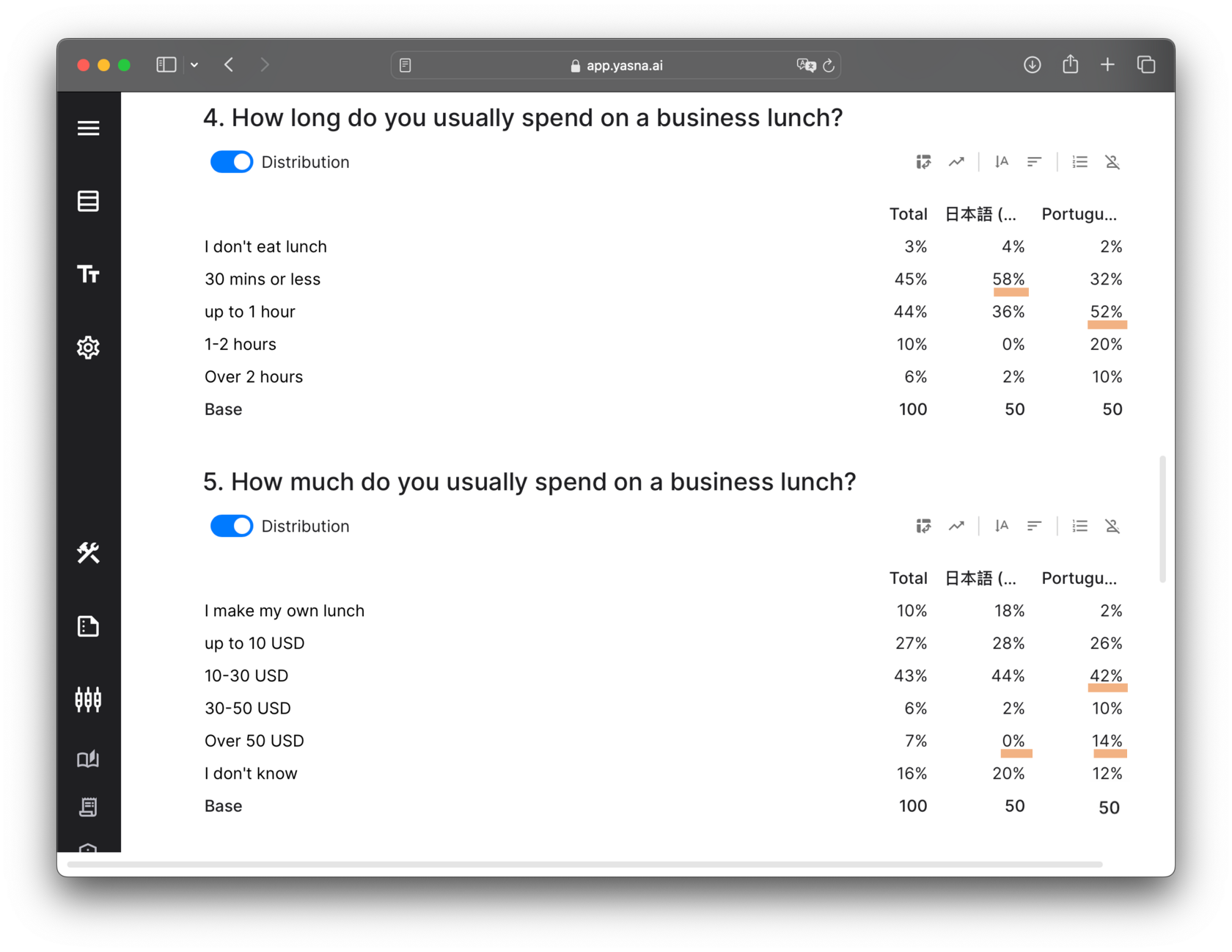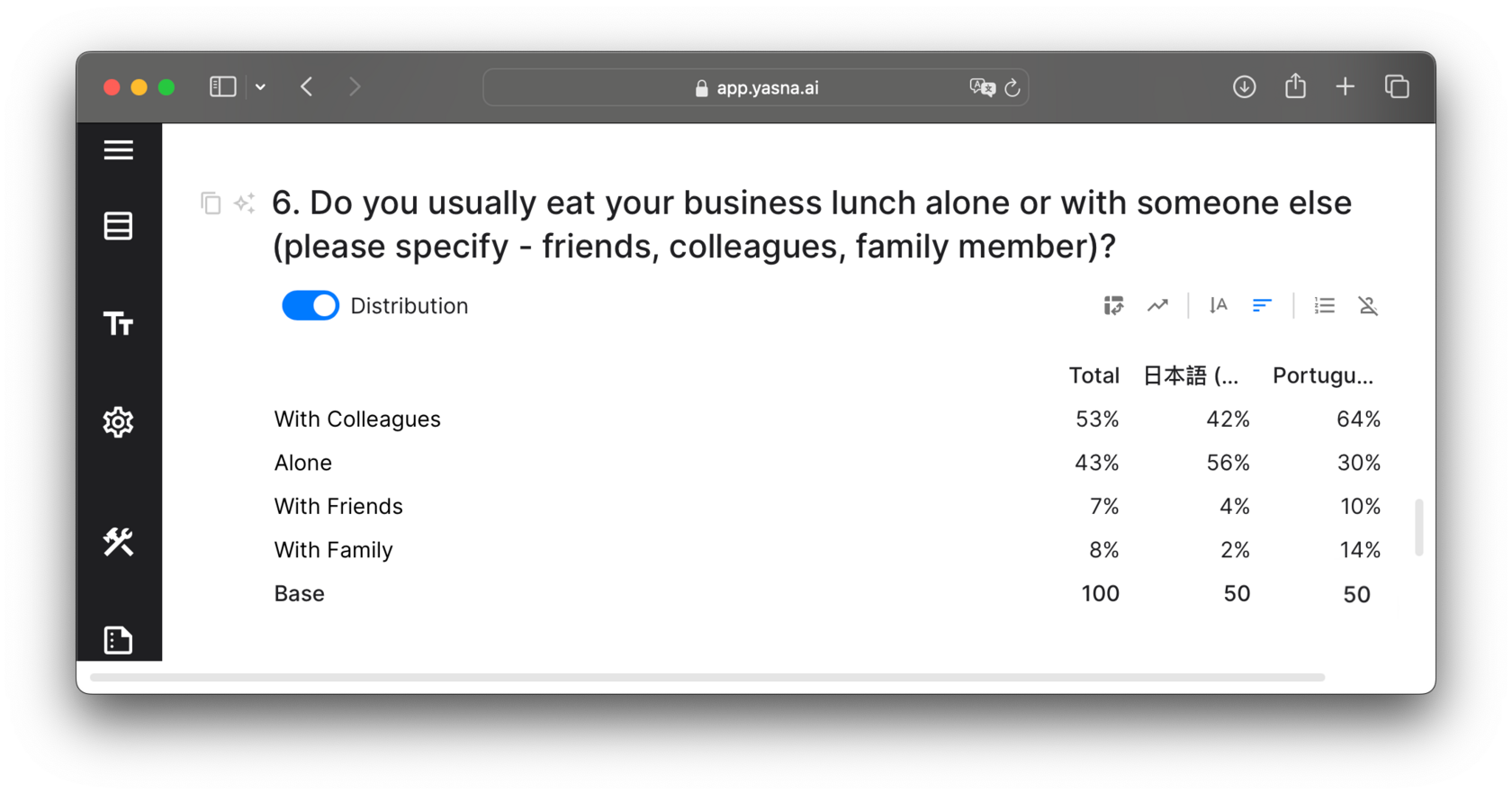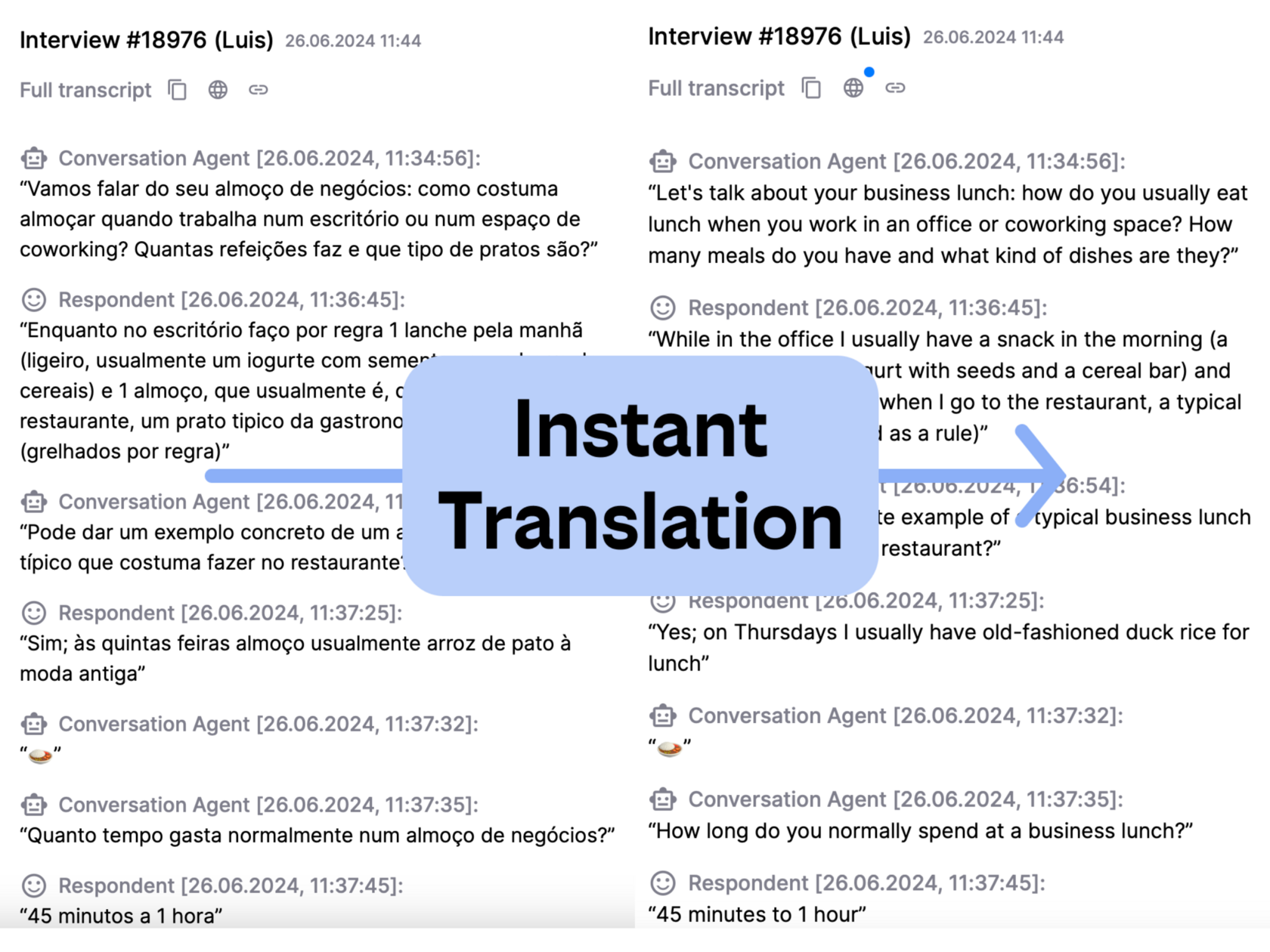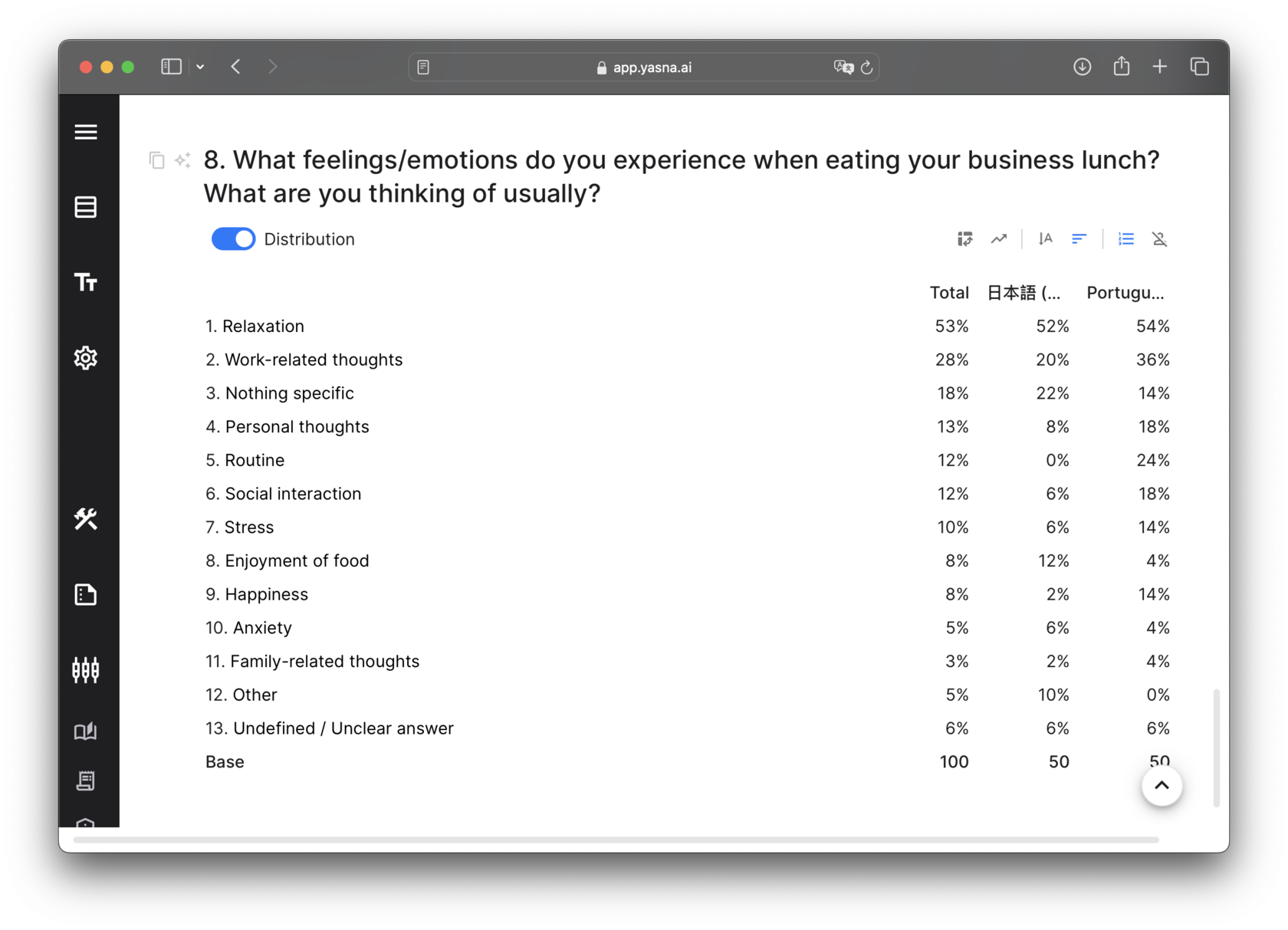Worlds Apart: Exploring Business Lunch Culture in Japan and Portugal with an AI Moderator
You don’t need market research to confidently say everyone everywhere likes food.

Similar cases:
Are Market Researchers Allergic to AI?Consumer Insights About Sex ToysConversational Research EvolutionBut there’s a realm of food experience that is unlike any other — business lunches.
Our AI moderator Yasna grilled (pun intended) people in Japan and Portugal about their habits and attitudes. Dig in before it gets cold!
In a rush?
Here are the key differences between business lunch habits in Japan and Portugal
Yasna conducted international research and created a report with insights and numbers to back them up
Japan
Shorter Lunch Breaks
The majority of Japanese respondents spend around 30 minutes or less on their business lunch, emphasizing efficiency and quick returns to work. 58% spend 30 minutes or less.
Eating Alone
There is a notable tendency for Japanese employees to eat alone, valuing personal downtime during lunch breaks. 56% eat alone.
More Home-Cooked Meals, Less Eating Out
A significant number of Japanese respondents bring meals from home (bento) to work, reflecting the cultural importance of homemade food. Buying food from convenience stores and eating at office canteens is popular, although many complain about the noise in such spaces.
Portugal
Longer Lunch Breaks
Portuguese respondents typically spend longer on their business lunches, often up to 1 hour or more, reflecting a more relaxed and social approach. 52% spend up to 1 hour, 20% spend 1-2 hours.
Eating Together
Portuguese employees predominantly eat with colleagues, friends, or family, indicating a more social and communal approach to meal times. 88% eat with colleagues, friends or family.
Mix of Home-Cooked Meals and Eating Out
Portuguese respondents often bring food from home. Many prefer literally going home for lunch, hinting at the importance of family values. They also frequently mention using office canteens, going to restaurants or cafes, reflecting a social aspect of lunch breaks.
“I suppose that it is rather a cultural attitude towards spending money on a business lunch: if I consider business lunch a great time with family/friends/colleagues and want to really relax and enjoy it, then I am ready to spend more money on it (Portugal), but if It’s less about pleasure and more about necessity (have a quick snack and get back to work), then I’d rather not spend on it.”
Let’s feed your curiosity!
Qualitative market researchers love a juicy in-depth interview. Quantitative market researchers value the cold hard facts provided by the numbers. We’re here to satisfy both — Yasna combines qualitative depth with quantitative scale.
How did we set up this reseach?
One of our MRX experts wrote the guide with probing instructions. Then we let Yasna do the talking (and the reporting).
You only need to set up Yasna once when you launch a project and it will do the rest automatically.
Who participated in the study?
Men and women, 25-55 y.o., Japan and Portugal Work from office/coworking at least 2 times a week 100 in-depth chat-interviews conducted in total
Cultural differences between 2 countries. Scaled
Without further ado let’s take a peak inside the platform to review the numbers and the conclusions provided by Yasna.

Lunch fulfils different functions in 2 countries. This impacts both time and money spent on it
Japan
Cost Sensitivity
Respondents in Japan generally report lower expenditures on business lunches due to economic constraints and rising prices. Many prefer bringing homemade lunches to save money.
“Most people bring lunch from home or buy it at convenience stores.” – Male, 53
Portugal
Higher Expenditures
Portuguese respondents report a wider range of expenditures, from $13 to $48. There is a notable acceptance of these costs, reflecting perhaps a higher disposable income or different economic expectations.
“I usually spend $45 to $65. It’s a reasonable price, there are restaurants that charge more.” – Female, 55

Yasna AI Report Scaling Feature. Adding Numbers to Insight
Japan
Less Time Eating, More Time Unwinding
A common stereotype is that the Japanese are workaholic to the point of “overwork death” or Karoshi (Japanese: 過労死). However, business lunch is perceived as a way to tune out from work. In fact, the respondents generally spend less time on eating — often around 20-30 minutes to maximise their break time for other activities or rest. While some respondents do eat with colleagues, a significant number prefer to eat alone.
“20 minutes is enough. I want to use the remaining 40 minutes freely.” – Female, 49
“If I were to eat alone, I would like to spend more time for lunch.” – Female, 45
Portugal
Longer Breaks for Conversation-Centred Lunches
Portuguese respondents seek out communication in all shapes and forms, whether it’s with colleagues, friends or family. They typically spend more time on business lunches, often ranging from 45 minutes and up to 1.5 hours. This reflects a more communal approach to meal times as well as a workplace culture that encourages social interaction and team bonding during lunch breaks.
“I have lunch with business partners. We need at least 2 hours to finalise details of a sale.” – Male, 42


Everyone tries to relax at lunch. Not everyone succeeds
Japan
Environment matters.
Respondents mentioned noisy environments to be a cause of stress during lunch…as if work worries weren’t enough! 20% admitted to thinking about their afternoon tasks or feeling stressed about work during lunch. Notably, enjoyment of food is 3x higher in Japan than in Portugal. Perhaps because they are more focused on the act of eating and less distracted by talking to peers?
“Sometimes people yell while eating in the cafeteria. It’s frustrating.” – Male, 41
Portugal
More stress AND more happiness.
Interestingly both stress and happiness levels are much higher in Portugal than in Japan. The respondents frequently described lunch breaks as a time to disconnect from work and to tune out work stress, though not everyone manages: work-related thoughts are at 36% in Portugal.
“Lunch time is relaxing because I can do something other than work.” – Male, 47
Why this information is important
By understanding and respecting cultural nuances and preferences, companies can tailor their lunch-related offerings, workplace amenities, food services, and employee wellness programs to better suit the needs of employees in different regions, as well as create
a more inclusive and culturally-sensitive work environment to enhance workplace satisfaction and productivity.
Maybe you could even create a truly stress-less lunch experience. Imagine!
Continue reading
Top picks about AI-powered interviewing



